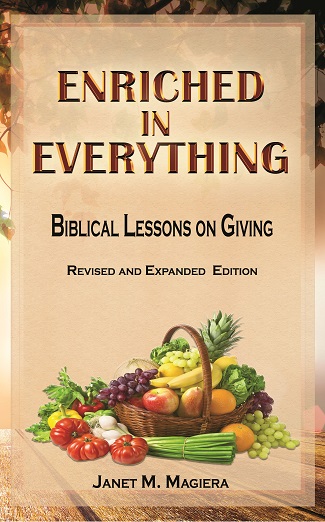
Establishment of the Offering
The first offering recorded in the Bible is from Abel and Cain. It is recorded that at the end of days (meaning the end of the week) Cain and Abel brought something to the Lord, Yahweh. The end of the week might imply that it was on the seventh day, however it appears to be a more general idiom.
Before we discuss the offering and what it was, we need to go even farther back in Genesis and see why they were bringing an offering at all.
When Adam and Eve sinned, they had been told, “In the day that you eat thereof, ye shall surely die.” They didn’t die that day when God found them in the garden. Why not? I believe that the reason they did not die, was that God told them that it was available for something else to die as a substitution for their sin and so that the sin could be forgiven. That is the reason he made them robes of skin. An animal was slain in the place of Adam and Eve so that they did not die. Then they were given the coats of skin to be a reminder of how they had been forgiven. It was a principle that remains throughout the Word of God:
This principle was unfolded to Adam and Eve and they taught it to their sons, Cain and Abel. The acknowledgement of the substitution for sins was the foundational reason for the offering. Now we can understand why Abel’s offering was accepted, but Cain’s was not. It is not recorded that Cain gave a poorer offering (not the best fruits) and later on in the Law, it is perfectly acceptable to give of the fruit of the ground as an offering. What he did was not acknowledge that he needed forgiveness.
Cain thought he had a better idea than God regarding what would be a good offering. His offering was not accepted by God. It says in verse 5 above, “toward his offering he did not look.” God did not even notice that Cain had given an offering. Yet he accepted Abel’s offering wholeheartedly. Then not only did Cain substitute his own idea of what the offering should be, he refused to change once it was not accepted. Does this sound like so many of us?
Cain burned with anger and his face fell. It is the next temptation mentioned in the Bible also, after Adam and eve’s sin. The temptation was to think that we have a better idea than God. This temptation is further explained in the passage.
Sin is pictured here in the Hebrew like a lion crouching to overcome its prey. The Rabbinic interpretation understands the masculine “it” as a reference to an “evil inclination.” “Sin is an evil influence at the door” is a great translation of the difficult Hebrew passage. If Cain had done well, his offering would have been accepted. Because he did not, he let the sin come and pounce on him as prey and he was overcome by it. This led to the murder of Abel, because Cain refused to change and continued to think that he was right. His next mistake was that he did not take responsibility for his own actions, seek to be forgiven, but instead, blamed someone else for his own faults. Does this sound typical also of our human tendency?
Abel understood that the first lesson of worshipping God was to be obedient and to do what He said, not what he thought might be good. It was his faith that was accepted by God because he was acknowledging that God was the source of his righteousness. Righteousness here means simply a right standing with God. Hebrews states this succinctly and uses Abel as the first example of faith:
Abel, on the other hand, went beyond the original unfolding of the sacrifice for the forgiveness of sins, and understood that it was important to give of the FIRSTborn of the flock and from the fat portions. It is not indicated in the text whether he received this as revelation from Yahweh or not, but it is the outward show that his heart was to honor God with the best that he had. This is also more important than just that Abel gave of his best from his flock. He understood that the offering was pointing to what the Lord Jesus Christ was going to do to provide salvation.
Jesus had to die so that his blood would be shed for the sins of mankind. He was the complete substitute. He was the firstborn and the best sacrifice because he was God’s only-begotten Son. The first offering is the acknowledgement of this provision that God was going to make for mankind.
Then it was for God to give his testimony that He had accepted it. We do not earn the acceptance of God because of our offering. The offering only represents what we believe about the substitution for Jesus for our sins. God pronounces us righteous and accepts us only in the person of Jesus Christ. Why? Because God accepted the once and final offering when He raised Jesus from the dead. That was the acceptance, just as He accepted Abel’s offering.
E.W. Bullinger sums up this point with these words: “Abel believed God, and he was judicially acquitted. God bore witness to his gifts by accepting the death of the substituted lamb, instead of the death that Abel deserved as a sinner. Hence Abel was righteous; and stood judicially acquitted before God.” [2]
What Abel understood and why he is a great example of faith is that there is nothing we can give to God that is good enough. We must have the offering accepted by God because of 1) obedience, and 2) faith in the complete substitution of Jesus for our sins. Only then will any offering be accepted.
We can now take this and learn the lessons regarding offering. There is nothing that we have of ourselves that is good enough to present to God. Only in obedience to His revelation will there be an acceptance of the offering and also the one offering. Only when we keep in mind the finished work of Jesus Christ and that He only is the complete sacrifice for our sins, will any offering be accepted. These points are very humbling. May God continue to show us how to apply them in our own lives.
[1] Bullinger, Great Cloud of Witnesses, p. 32.
[2] Bullinger, p. 65.



